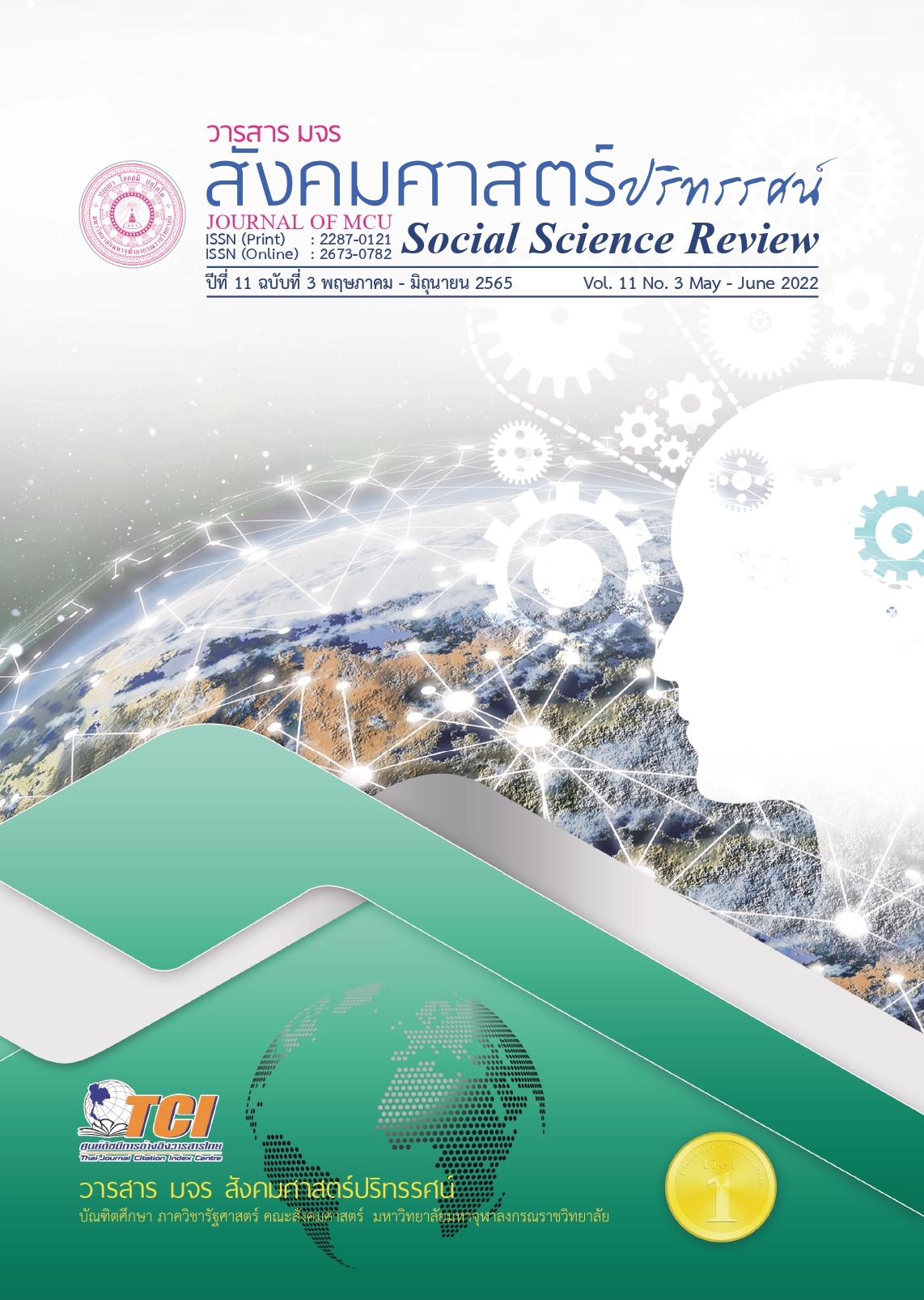การพัฒนาเยาวชนต้นแบบ ด้านคุณธรรมจริยธรรม ของคณะสงฆ์จังหวัดสุราษฎร์ธานี
บทคัดย่อ
บทความวิจัยนี้มีวัตถุประสงค์เพื่อวิเคราะห์สภาพทั่วไป กระบวนการ และนำเสนอรูปแบบการพัฒนาเยาวชนต้นแบบ เป็นการวิจัยแบบผสานวิธี ระหว่างการวิจัยเชิงคุณภาพโดยสัมภาษณ์เชิงลึกผู้ให้ข้อมูลสำคัญ 18 รูปหรือคน และการสนทนากลุ่มเฉพาะกับผู้ทรงคุณวุฒิ 8 รูปหรือคน วิเคราะห์ข้อมูลโดยการพรรณนาความ กับการวิจัยเชิงปริมาณดำเนินการโดยศึกษากลุ่มตัวอย่าง 283 คน เครื่องมือที่ใช้ในการเก็บรวมรวมข้อมูลคือแบบสัมภาษณ์ แบบสนทนากลุ่มเฉพาะ และแบบสอบถาม สถิติที่ใช้ในการวิเคราะห์ข้อมูลได้แก่ ค่าความถี่ ค่าร้อยละ หาค่าเฉลี่ย ส่วนเบี่ยงเบนมาตรฐาน
ผลการวิจัยพบว่า 1. เด็กและเยาวชนขาดการอบรมสั่งสอนให้มีความรู้ ความเข้าใจในการศึกษาหลักธรรม คุณธรรม จริยธรรม 2. กระบวนการพัฒนาเยาวชน โดยภาพรวมอยู่ในระดับมาก มีค่าเฉลี่ยเท่ากับ 3.99 3. นำเสนอแนวทางการพัฒนา 3 ด้าน คือ 1) ด้านเนื้อหาหลักสูตรอบรม ด้วยการจัดการอบรมคุณธรรม จริยธรรม พระวิทยากรและผู้บริหารดำเนินการวิเคราะห์และวางแผนการจัดการอบรมโดยลักษณะการประชุมเชิงปฏิบัติการ 2) ด้านการจัดกิจกรรมการอบรม ด้วยการจัดกิจกรรมการอบรมคุณธรรม จริยธรรม จัดกิจกรรมอบรมในรูปแบบใหม่ ผสมผสานระหว่างการบรรยายและนำสื่อวิดีทัศน์มาใช้กระตุ้นการเรียนรู้ 3) ด้านการใช้สื่อการสอนในการจัดอบรมคุณธรรม จริยธรรม โดยอาศัยการใช้สื่อการสอนและแหล่งเรียนรู้ เป็นกลไกหลักในการอบรม ซึ่งพระวิทยากรต้องผลิตสื่อการเรียนการสอนให้มีความเหมาะสม
เอกสารอ้างอิง
เชวง เตชะโกศยะ. (2563). การปลูกฝังคุณธรรม จริยธรรมแก่นักศึกษา. สืบค้น 8 กรกฎาคม 2563, จาก www. jariyatam.com/th/moral-cultivation
พระครูนิวิฐวิริยคุณ (โปธาวิชัย). (2550). การพัฒนาคุณธรรมจริยธรรมนักเรียนของโรงเรียนการกุศลของวัดในพระพุทธศาสนา จังหวัดลำพูน (วิทยานิพนธ์มหาบัณฑิต สาขาวิชาการบริหารการศึกษา). ลำปาง: มหาวิทยาลัยราชภัฏลำปาง.
พระครูสมุห์บุญเลิศ ชยวฺโส (ชัยวงษ์). (2552). สภาพการจัดการเรียนการสอนของพระสอนศีลธรรมในโรงเรียน สังกัดสำนักงานเขตพื้นที่การศึกษาเชียงใหม่ เขต 1 (วิทยานิพนธ์พุทธศาสตรมหาบัณฑิต สาขาวิชาการจัดการเชิงพุทธ). พระนครศรีอยุธยา: มหาวิทยาลัยมหาจุฬาลงกรณราชวิทยาลัย.
พระประกาศิต ปญฺญาธโร (ยามประโคน). (2552). บทบาทของครูผู้สอนวิชาพระพุทธศาสนาในการส่งเสริมจริยธรรมของนักเรียนโรงเรียนวัดบ้านสะแกซำ ตำบลสะแกซำ อำเภอเมือง จังหวัดบุรีรัมย์ (วิทยานิพนธ์พุทธศาสตรมหาบัณฑิต สาขาวิชาการจัดการเชิงพุทธ). พระนครศรีอยุธยา: มหาวิทยาลัยมหาจุฬาลงกรณราชวิทยาลัย.
พระอลงกรณ์ กนฺตวณฺโณ. (2564). ประสิทธิภาพการจัดการอบรมคุณธรรมจริยธรรมแก่เยาวชนของคณะสงฆ์อำเภอเมืองเพชรบุรี. วารสารพุทธนวัตกรรมและการจัดการ, 4(1), 47-56.
สำนักงานคณะกรรมการการพัฒนาการเศรษฐกิจและสังคมแห่งชาติ. (2550). แผนพัฒนาเศรษฐกิจและสังคมแห่งชาติ ฉบับที่ 10 (พ.ศ. 2550 – 2554). กรุงเทพฯ: สำนักงานคณะกรรมการการพัฒนาการเศรษฐกิจและสังคมแห่งชาติ.
สำนักงานคณะกรรมการการศึกษาแห่งชาติ. (2543). ปฏิรูปการเรียนรู้ ผู้เรียนสำคัญที่สุด. กรุงเทพฯ: โรงพิมพ์คุรุสภาลาดพร้าว.
สุมนภัค วรภัทรทรัพย์. (2563). การอบรมคุณธรรมจริยธรรมของพระสงฆ์แก่นักเรียนโรงเรียนบางแพปฐมพิทยา จังหวัดราชบุรี. วารสารพุทธนวัตกรรมและการจัดการ, 3(2), 33-43.
ดาวน์โหลด
เผยแพร่แล้ว
รูปแบบการอ้างอิง
ฉบับ
ประเภทบทความ
สัญญาอนุญาต
ลิขสิทธิ์ (c) 2022 วารสาร มจร สังคมศาสตร์ปริทรรศน์

อนุญาตภายใต้เงื่อนไข Creative Commons Attribution-NonCommercial-NoDerivatives 4.0 International License.
เพื่อให้เป็นไปตามกฎหมายลิขสิทธิ์ ผู้นิพนธ์ทุกท่านต้องลงลายมือชื่อในแบบฟอร์มใบมอบลิขสิทธิ์บทความให้แก่วารสารฯ พร้อมกับบทความต้นฉบับที่ได้แก้ไขครั้งสุดท้าย นอกจากนี้ ผู้นิพนธ์ทุกท่านต้องยืนยันว่าบทความต้นฉบับที่ส่งมาตีพิมพ์นั้น ได้ส่งมาตีพิมพ์เฉพาะในวารสาร มจร สังคมศาสตร์ปริทรรศน์ เพียงแห่งเดียวเท่านั้น หากมีการใช้ภาพหรือตารางหรือเนื้อหาอื่นๆ ของผู้นิพนธ์อื่นที่ปรากฏในสิ่งตีพิมพ์อื่นมาแล้ว ผู้นิพนธ์ต้องขออนุญาตเจ้าของลิขสิทธิ์ก่อน พร้อมทั้งแสดงหนังสือที่ได้รับการยินยอมต่อบรรณาธิการ ก่อนที่บทความจะได้รับการตีพิมพ์ หากไม่เป็นไปตามข้อกำหนดเบื้องต้น ทางวารสารจะถอดบทความของท่านออกโดยไม่มีข้อยกเว้นใดๆ ทั้งสิ้น





